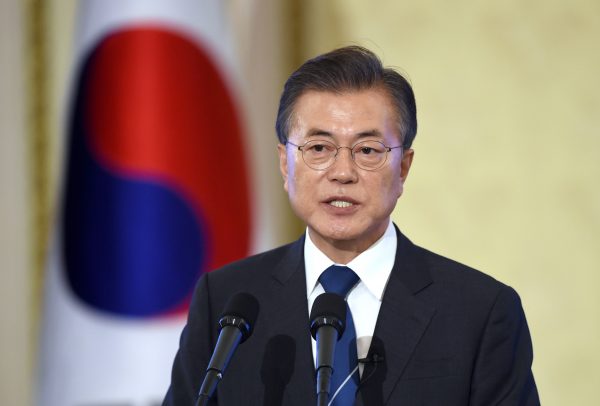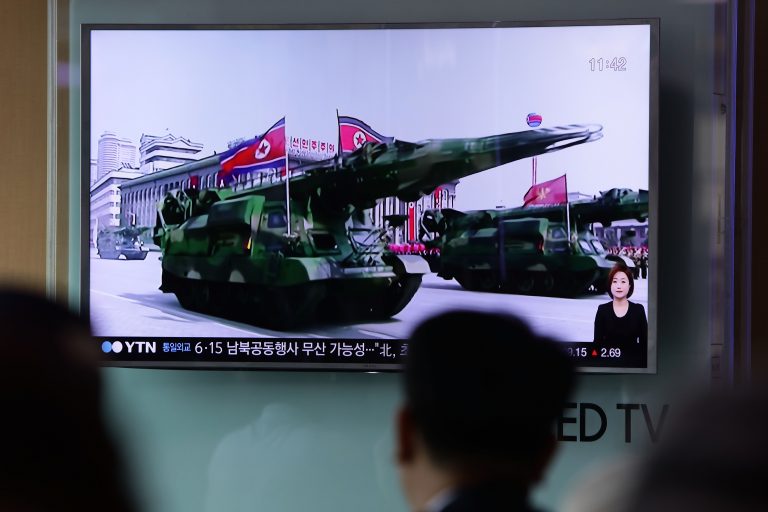As North Korea continues to test its ballistic missiles, South Korean President Moon Jae-in warned on Thursday, Feb. 10, that the Korean peninsula would be “instantly” thrown into crisis.
While the West plunges into a hostile standoff on its own, the circumstances surrounding North Korea’s missile test once again threatens to end the decades-long ceasefire between the two Koreas.
North Korea fired what is thought to be the longest-range missile since 2017, suspected to be a ballistic missile by South Korea’s Joint Chiefs of Staff.
The test was reported to have been done in the morning at North Korea’s Jagang Province. The missile itself is believed to be a Hwasong-12 “intermediate-range ballistic missile (IRBM)”, estimated to have flown as high as 2,000 kilometers for 30 minutes to as far as 800 kilometers, Japanese Chief Cabinet Secretary Hirokazu Matsuno reported.
“That’s a bigger missile [longer-range] than anything since November 2017,” Ankit Panda from the Carnegie Endowment for International Peace said on Twitter. “Likely IRBM.”
Success
You are now signed up for our newsletter
Success
Check your email to complete sign up
Bolstered by the need to improve North Korea’s military capabilities, leader Kim Jong Un claimed to have made several missile launches in a frequency not seen since 2017. Pyongyang also blames the U.S. for escalating tensions by moving for new sanctions against the communist nation.
Pyongyang stated that it had launched two long-range cruise missiles before mentioning that its ruling party’s Politburo had considered continuing “all temporarily suspended activities” to test nuclear weapons and intercontinental ballistic missiles (ICBMs).
READ MORE:
Ordinary North Koreans Steal Feces for Fertilizer While Officials Import Chinese New Year Luxuries
Prelude to crisis
Alarmed by the growing aggression of North Korea’s tests, President Moon met with the National Security Council “for the first time in a year,” calling upon North Korea to cease firing missiles.
Later on Thursday, Moon hoped that “dialogue and diplomacy” would prevent the peninsula from “instantly” falling into a crisis should Pyongyang continue to test nuclear or long-range missiles.
“If North Korea’s repeated missile launches go as far as to breach (Kim’s self-imposed) moratorium, that would instantly bring the Korean Peninsula back to the crisis situation of five years ago when there were concerns of war,” Moon said to the media on Thursday.
“The political leaders of related nations should engage in persistent dialogue and diplomacy to prevent a similar crisis.”

With Seoul’s presidential elections coming in March, Moon will be leaving office in May, completing his five years as President of South Korea.
As such, he fears that he would not be able to initiate another summit with Kim Jong Un before he leaves, cutting short his plan to formally bring an end to the 1950-1953 Korean War.
According to Moon, his greatest achievement was helping “shift the direction toward dialogue and diplomacy rather than military confrontation”, but lamented the failure of the U.S.-North Korea summit in Hanoi.
Despite the fallout of the 2019 summit’s failure, Moon hopes that the U.S. and North Korea would meet again, saying it would be “only a matter of time.”
He also pressed for “necessary communication” with Kim, believing that President Biden could help use “strategic patience” to continue dialogue between the two countries.
Other reactions
When Pyongyang conducted its fourth missile test in January, Japan condemned the communist government, citing it as a threat to its “peace and security”.
“We strongly condemn the series of North Korean actions, including the repeated launches of ballistic missiles, that threaten the peace and security of Japan and the region, and the international community,” Japan’s Chief Cabinet Secretary Matsuno said.
Despite condemning the missile launches, Washington is willing to negotiate peacefully with Pyongyang “without preconditions.”
As North Korea’s largest communist ally, the People’s Republic of China (PRC), has urged Washington for “flexibility” to attune to Pyongyang’s concerns, even going so far as to delay the U.S.’ bid for new sanctions on five North Koreans – an act which Russia followed behind.

















